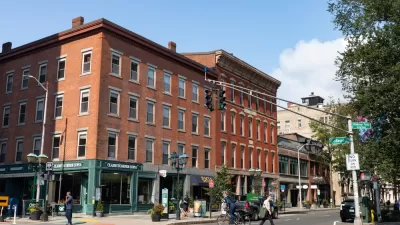A Vox explainer digs into one of the esoteric ideas of planning theory: a land tax.

Jerusalem Demsas writes to explain the potential of a land tax to potentially solve a number of fiscal problems while also creating an incentive for high value development.
Henry George first proposed a land tax in Progress and Poverty (1879), and the idea has hung around more esoteric economic discussions to this day—according to Demsas, the phrase "A land value tax would solve this" appears regularly on Twitter.
While proponents of a land value tax point to numerous fiscal challenges that could be solved with a land value tax, Demsas says one the idea offers a potentially straightforward solution for one of the country's biggest challenges: the cost of housing and the resulting lack of affordable options.
That crisis is caused, in part, by the failure to appropriately use valuable in-demand land for its best purpose. Millions of people want to live in New York City, Los Angeles, Washington, DC, or Seattle, but local tax regimes actually punish people for investing in their property. When people improve their property — either by adding a new room or building an entirely new structure like a multi-story apartment building, they’ll pay higher property taxes.
According to the article, the land tax isn't just an urban solution: small cities with vacant lots could also benefit from balancing the system of incentives. In both urban and more rural settings, according to the theory, under a land value tax, "property owners would be clamoring to be allowed to develop their land more intensely — leading to more homes being built."
The article includes a lot more explanation and links to the most prominent articles written on the subject in the past decade.
FULL STORY: Tax the land

Trump Administration Could Effectively End Housing Voucher Program
Federal officials are eyeing major cuts to the Section 8 program that helps millions of low-income households pay rent.

Planetizen Federal Action Tracker
A weekly monitor of how Trump’s orders and actions are impacting planners and planning in America.

Ken Jennings Launches Transit Web Series
The Jeopardy champ wants you to ride public transit.

USDOT Waters Down Self-Driving Car Regulations
The agency is reducing reporting requirements for autonomous vehicles and cars with self-driving features, prompting concern among safety advocates who say transparency is essential to the safe deployment of AV technology.

‘Minnesota Nice’ Isn’t so Nice When You Can’t Find a Place to Live
The Economic Development and Housing Challenge Program can help address the scourge of homelessness among Indigenous people.

NYC Open Streets Organizers Call for City Support
The number of open streets projects has dropped year after year as volunteer groups struggle to fund and staff them.
Urban Design for Planners 1: Software Tools
This six-course series explores essential urban design concepts using open source software and equips planners with the tools they need to participate fully in the urban design process.
Planning for Universal Design
Learn the tools for implementing Universal Design in planning regulations.
Heyer Gruel & Associates PA
Ada County Highway District
Institute for Housing and Urban Development Studies (IHS)
City of Grandview
Harvard GSD Executive Education
Toledo-Lucas County Plan Commissions
Salt Lake City
NYU Wagner Graduate School of Public Service





























